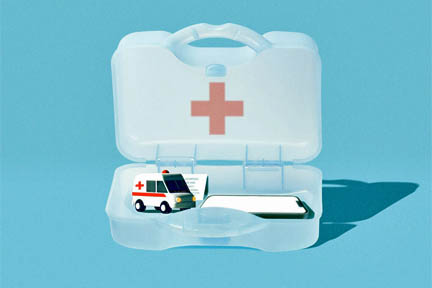The one thing paramedics wish people knew
News Category: News and General Discussion
-
Published July 13, 2024
By Jancee Dunn
When paramedics arrive at the scene of an emergency, they have to gather information, often quickly and under chaotic circumstances.
They need to know about a patient’s basic health, said Elizabeth DiRocco, a paramedic with the Los Angeles County Fire Department. But sometimes that person is incapacitated.
If paramedics are in a house, they’ll scan the fridge or the bathroom cabinet for medications and try to find identification in a wallet or a purse, DiRocco explained.
But scrambling for these items “eats up time,” said Anthony Almojera, a paramedic and lieutenant for the New York Fire Department. “Our role is to buy you time.”
Seconds count. Brain damage can occur in as little as five minutes if your brain is deprived of oxygen during a heart attack or stroke.
Most of us don’t want to think about the circumstances that might bring paramedics to our door. But there is something you can do today that could be an actual lifesaver: making your medical information handy. Here’s how.
Step one: Write down your details.
Almojera recommended jotting the following on a letter-size piece of paper and a sheet that can fit into your wallet: your name, date of birth, medical history, an emergency contact number and medications you are currently taking, as well as the dosage and any allergies.Those basic details are helpful, “but the more health information, the better,” Almojera said. Including your blood type, for example, is useful for the emergency room doctors if a blood transfusion is needed, he said.
If you’re able to laminate both sheets to protect them, even better, Almojera said. (Office supply stores carry inexpensive self-sealing laminating pouches).
Step two: Keep the sheets somewhere that’s easy to find.
Tuck the smaller sheet into your wallet, and place the larger one on the refrigerator, on the front door of your home “or someplace that, if you’re unconscious on the floor, I may think to look,” Almojera said.You have just saved a crew crucial minutes “trying to search for that stuff,” Almojera said.
The sheet is useful if you’re unable to tell the paramedics the information yourself, DiRocco said, and if someone called 911 on your behalf. In those cases, that person may be too upset or distracted to remember critical medical information.
“Sometimes a relative will hand us, like, a shoe box of medications,” she said. A preprinted sheet, she added, “is going to be so helpful to us.”
Step three: Put the same information onto your phone.
You should also set up your medical ID on your iPhone or Android, said Christopher Moehlenkamp, a paramedic from Fort Wayne, Ind. That way, he said, emergency medical workers can obtain your information without using a passcode.I took Moehlenkamp’s advice and put all my health data onto my phone last weekend. It took five minutes. Then, I had my entire family do it.
There are, of course, other things that paramedics want you to know, but here are two quick ones: If you’ve called 911 from your home and are able to, unlock your door. People get caught up in the moment and forget, DiRocco said.
And lock up any pets. That doesn’t mean exclusively dogs and cats. “Some people have dangerous snakes,” Almojera said. “We’ve done jobs where people had an alligator. Years ago, there was a guy in Harlem who had a tiger.”
“If you have a tiger,” he added, “lock it up before I get there.”
-


Leave a Reply